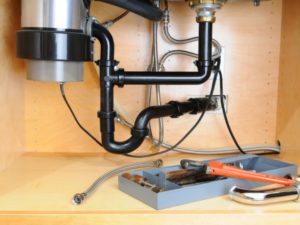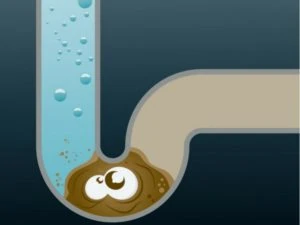Thanks to modern plumbing technology, your pipes and drains keep your home clean, safe, and livable. However, sometimes these drains, or the water supply itself, can develop that well-known and unwanted smell of rotten eggs.
If you suspect a drain is the source of the smell, the first step is to try and isolate the specific drain. Try smelling each room where a drain is present, and seal off the odorous drains with a plastic bag. Leave the room for about an hour, and if the smell has cleared up, you’ve found the root of your problem.
Once you’ve found the origin of the sewer gas smell wafting throughout your home, it’s time to figure out the exact cause. Here are the top 3 reasons behind water and drains that smell terrible:
1. Venting Issues
Every pipe in your home should have a small amount of water held within a u-shaped pipe. This water and pipe combination acts as a seal for your drains, preventing the leakage of sewer gas.
Insufficient or faulty venting does not allow atmospheric pressure in, or sewer gas out of a home, causing the sewer gases to be forced back down your pipes, and up through the drains.
Clogs can be caused by various issues, such as:
- Animal nests
- Leaves
- Debris
- Snow
If the venting issue is caused by a clog, it will cause a high-pressure problem.
Without ventilation, high pressure in the drain will cause sewer gas back through drains and toilets, stinking up your home.
If the ventilation problem is due to a lack of water within the u-pipe, the low pressure can cause siphoning of the pipes, and gas can easily enter your home.
2. Water Heater
Water heaters are moist, warm areas, creating the perfect environment for bacteria to grow. This excess of bacteria creates the unmistakable “rotten egg” smell, which can cause your water and drains to smell.
Depending on where your water supply comes from, your water may have high levels of sulfur. When this sulfur encounters bacteria and the metal components of your water heater, this rotten egg smell begins.
There are two main methods of eliminating this problem within your water heater:
- H2O2 Flush: You can clean your water heater regularly with H2O2 (hydrogen peroxide). Hydrogen peroxide kills bacteria, while being safe for the environment.
- Replace Your Anode: Replacing your aluminum or magnesium anode in your water heater can help eliminate this smell, as the sulfur and bacteria feed off these metals. You can replace these anodes with one made of both aluminum and zinc.
If these fixes do not work, you may be dealing with a problem further up your water supply. Homeowners can try and install a water filtration system to help filter out the sulfur before it reaches your hot water tank.
3. Dried Out P-Trap
All plumbing fixtures and drains have a p-trap, which is the u-shaped piece of pipe holding a small amount of water continuously. This water forms a seal, protecting your home from sewer gases. If this p-trap is dried up, sewer gas will be allowed into the waste pipes.
 These p-traps dry out due to:
These p-traps dry out due to:
- A leak in the pipe
- Disuse of the water pipe
- A blockage that is siphoning water out of the pipe, breaking the seal
If you notice a foul smell emanating from a pipe that is not used often, try running water again for a couple of minutes.
This should add water back into the p-trap, and create a safety seal once again.
If the smell is coming from a pipe commonly used, check for blockages such as clumps of hair or other organic matter. If that doesn’t seem to be the problem, call in a plumbing professional to further inspect the problem.


